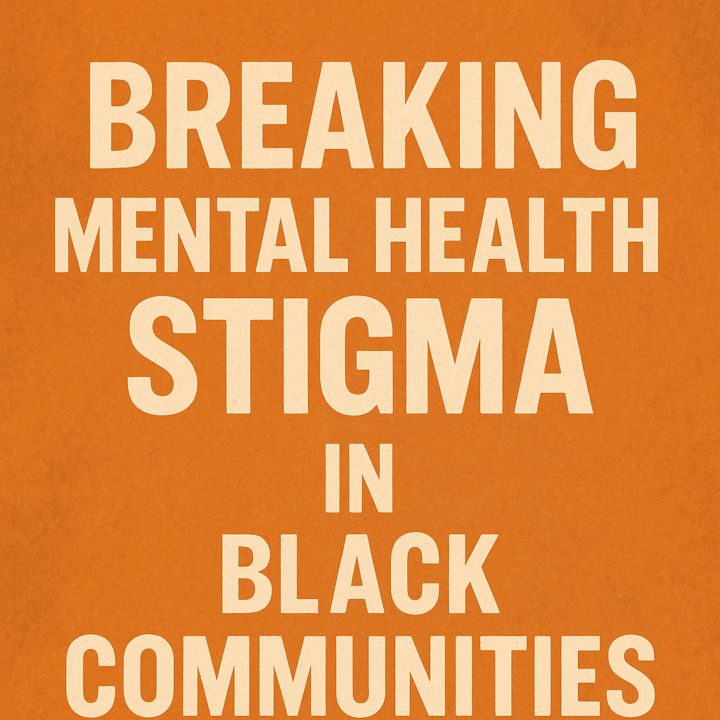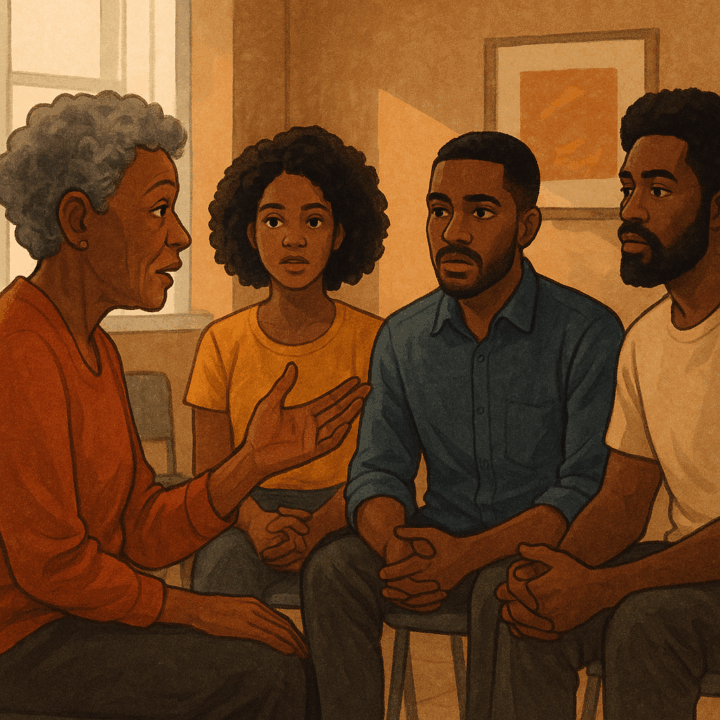Each May, Mental Health Awareness Month reminds Americans to prioritize mental wellness and destigmatize mental illness. Founded in 1949 by Mental Health America, this observance mobilizes educational campaigns, resource toolkits, and community events nationwide. In Black communities, however, centuries of systemic racism, from enslavers’ pseudoscientific diagnoses to Jim Crow segregation, have seeded enduring mistrust toward healthcare institutions and equated mental distress with moral weakness. Although African Americans experience 20 percent higher rates of serious psychological distress than white Americans, only one in three Black adults with mental health needs ever receive treatment. This disparity underscores the urgent need for culturally grounded, community‑anchored strategies. This article traces the historical roots of stigma, profiles groundbreaking community‑based approaches, and celebrates Mental Health Awareness Month by spotlighting events that unite Black communities in dialogue, art, and healing.

Source: ChatGPT
Historical Context
Early Beliefs and Scientific Racism (1700s–1800s)
In the early 1700s, Southern physicians labeled the enslaved desire for freedom “drapetomania” and pathologized Black humanity with “dysaesthesia aethiopica,” embedding pseudoscientific racism into medical practice. These so‑called diagnoses were tools to uphold slavery by deeming natural human responses to oppression as mental disorders.
Jim Crow and Segregation (1877–1965)
After Reconstruction, Jim Crow laws enforced segregation across all aspects of life, including health care. Black patients were relegated to underfunded hospitals and asylums, reinforcing narratives that Black mental health was incompatible with mainstream psychiatry. Segregated care not only compromised treatment quality but also deepened community distrust.
Medical Mistrust: Tuskegee and Beyond
The Tuskegee Syphilis Study (1932–1972) epitomized medical betrayal. Hundreds of Black men were deceived and denied treatment so researchers could observe disease progression. This atrocity, and similar experiments, cemented fears of exploitation, deterring generations from seeking psychiatric or psychological help.
Roots of Stigma
Cultural narratives of resilience and self‑reliance, forged under oppression, often frame mental illness as a personal failure rather than a medical need. The “strong Black woman” celebrated in public discourse, can discourage vulnerability and reinforce shame around seeking therapy. Research shows Black adults are 20 percent more likely to report serious psychological distress yet only 25 percent seek mental health care, compared to 40 percent of whites, reflecting both stigma and access barriers. Fear of being labeled “crazy” and concerns about confidentiality, especially in small communities, further suppress help‑seeking.
Rise of Community‑Based Solutions
A diverse array of community‑based initiatives are shaping how Black communities approach mental wellness. These programs leverage trusted local spaces and culturally resonant facilitators to foster open dialogue, reduce stigma, and increase help‑seeking intentions. Early evaluations report measurable gains in mental health literacy, reductions in self‑reported stigma, and higher rates of referral to professional care among participants.

Source: ChatGPT
NAMI Sharing Hope Conversations
NAMI’s Sharing Hope series is a free, three‑part community conversation model co‑designed by and for Black and African Ancestry communities to “take the narrative back” by sharing sacred stories around mental wellness. Facilitators use high‑quality videos and discussion guides in settings from churches to barbershops to prompt dialogue on youth wellness, leadership resilience, and family healing. According to NAMI, only one in three Black adults with mental health needs receive treatment, making these safe spaces critical entry points for support.
Barbershop Dialogues and Peer Advocacy
The Confess Project has trained over 1,900 Black barbers across 48 cities to serve as certified mental health advocates by equipping them with active listening, validation, and stigma‑reduction skills. Evaluations by Harvard University found that post‑training, 58 percent of barbers reported increased confidence in identifying mental health warning signs and referring clients to professional care. Regional programs in Northeast Ohio similarly recruit barbers as “mental health intermediaries,” resulting in a 35 percent uptick in help‑seeking calls from referred clients. Lines for Life extends this model to hairstylists statewide, providing Mental Health First Aid training and supporting them in hosting community conversations in salons. George Mason University’s “It’s OK not to be OK” initiative uses barber shops in Virginia to destigmatize therapy among Black men, with 80 percent of barbers reporting sustained mental health discussions beyond the training period.
Faith‑Based Programs and L.E.T.S. Save Lives
AFSP’s L.E.T.S. (Listening, Empathy, Trust, Support) Save Lives is a 90‑minute, activity‑based suicide prevention presentation co‑created by Black mental health experts to reduce cultural stigma and foster help‑seeking in Black and African American communities. Launched in February 2024 with support from Omega Psi Phi fraternities and HBCUs, the program reported a 40 percent increase in participants’ confidence to intervene in a suicidal crisis. Soul Shop™ for Black Churches offers a one‑day workshop that equips faith leaders with suicide awareness tools, leading to a 25 percent rise in congregant referrals to mental health resources.
BEAM and Healing Justice Frameworks
The Black Emotional and Mental Health Collective (BEAM) advances a healing‑justice model aimed at dismantling barriers to care through education, training, and advocacy in Black communities Beam Community. Under founder Yolo Akili Robinson, BEAM provides grants, hosts “Black Healing Remixed” workshops, and offers a directory of Black‑led practitioners—efforts recognized by a 2023 U.S. Surgeon General citation and a $200k donation from Jordan Peele Ford FoundationVerywell Mind. BEAM’s training programs report that 75 percent of participants feel better equipped to address community trauma and mobilize support networks post‑workshop Bon Appétit.
Other Innovative Models
PsychoHairapy, founded by Dr. Afiya Mbilishaka, trains salon professionals in “micro‑counseling” techniques, enabling hairstylists to recognize distress signals and offer empathetic support; trainees report a 30 percent boost in client mental‑health referrals. The Black Impact lifestyle program, a 24‑week community fitness and mentorship intervention, demonstrated significant reductions in depressive symptoms (p < 0.05) among participating Black men, highlighting the potential of holistic, culturally specific approaches
Impact and Future Directions
Although only 25 percent of Black adults seek mental health treatment when needed, versus 40 percent of whites,community‑based models consistently show improved literacy and engagement, suggesting scalable pathways to equity. Future research should focus on large‑scale randomized trials and longitudinal studies to quantify long‑term outcomes, cost‑effectiveness, and best practices for broader implementation. Advocate for equitable mental health policies, such as increasing funding for training Black mental health professionals, to address workforce disparities (currently less than 2 percent of APA members identify as Black). By uniting our voices, talents, and resources, we can consign stigma to history and forge a future where mental wellness is recognized, celebrated, and accessible for all Black communities.

Anand Subramanian is a freelance photographer and content writer based out of Tamil Nadu, India. Having a background in Engineering always made him curious about life on the other side of the spectrum. He leapt forward towards the Photography life and never looked back. Specializing in Documentary and Portrait photography gave him an up-close and personal view into the complexities of human beings and those experiences helped him branch out from visual to words. Today he is mentoring passionate photographers and writing about the different dimensions of the art world.





